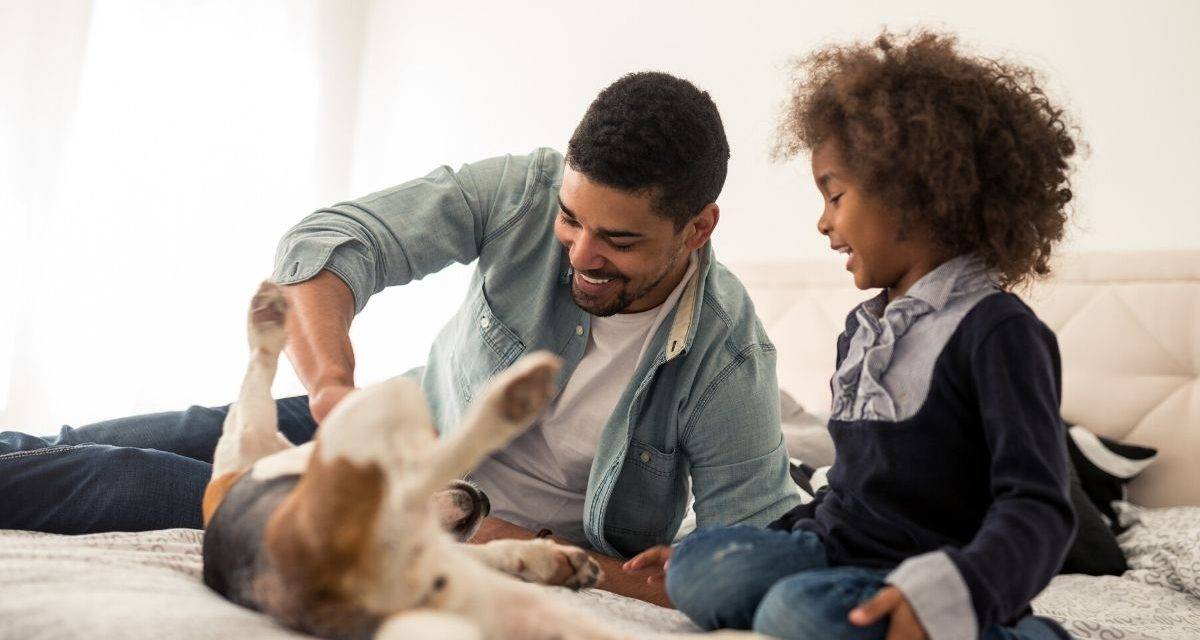The Family Pet: Yes, No and How?

Many of us grew up with pets, and enjoy the relationship and feelings that a pet can bring to the home. Now, as adults, we may have brought a pet into the family, or perhaps are considering a family pet. If you are wavering about the benefits of a family pet, let’s go over a few proven facts.
The Value Of Having A Family Pet
While the studies in the area are not necessarily the tightest in design, the results are consistent and tend to follow our personal intuition as pet owners. Here are some of the repeated findings:
- Dogs tend to lower blood pressure and heart rate under stress
- Caring for a pet tends to create a sense of companionship and belonging for the lonely
- Watching fish in a fish tank lowers blood pressure
- Heart attack victims are 8.5 times more likely to be alive one year later with a dog as a pet
- Pet owners have a lower risk of coronary heart disease
- Owning a dog tends to reduce anxiety and blood sugar, due to walking habits
- Dog and cat owners present with fewer minor physical complaints
- Pets reduce the impact of highly stressful life events
- Depression and anxiety are lessened with bringing a pet into the home
- Dogs, in particular, serve as social lubricators when in public.
But Do Pet Benefit Children In Particular?
While the research seems clear that we adults get health, as well as psychological, benefits from owning a pet, what are the benefits for our children…if any? Here again, our intuition would tell us that owning a pet must be good for kids.
However, the research here is inadequate and conflicted. Unlike the impact on adults, we simply have conflicted results, or an absence of quality research to conclude strongly that children benefit from pet ownership. For some families, mom and dad take over the pets, and children are not involved in their care. For others, families become so active that the pet fades into the background, and becomes ignored. (This is heart-wrenching for those of us who are pet lovers, finding abandoned pets at the shelter who simply become disposable when they are no longer interesting.)
Also, children may fall in love with the puppy at the kennel, but then only wants the ‘good times’ without stepping up to take on more responsibility. Some pets spend much time outdoors, and others are indoor pets. These are all variables that make the research conflicted and confusing about the benefits of pet ownership for children.
Thus, we can’t muster a data-based argument that you ‘should go out and get your son or daughter a pet.
But let’s assume that you might be somewhat like me. You grew up with pets, cared for them, and loved them. When they were sick, you nurtured them. When they passed, you cried. You cannot imagine that your life was not made better by the influence of the family pet.
In my life, pets have played an integral part in my development. As a child and adolescent, I learned about compassion, friendship, responsible care, and loss. All important parts of life. So, I have no doubt about the personal value of owning a pet.
However, as a psychologist consulting with families daily, I see the differences in how seriously parents take the role of pet ownership. This variation in families may easily explain the inconsistent conclusions about pet ownership.
Thus, let’s consider how we can optimize the home so the pets can be of maximum benefit to our families, and we can fulfill our responsibility to our pets as well.
Setting Up A System Of Responsible Pet Care
To ensure that kids can learn and benefit from pet ownership, consider these simple guidelines:
1. If Possible, Have A Clear Discussion Before Getting The Pet.
Go over the treatment of the pet, and how each member will take on the responsibility of care. Emphasize that time daily will be devoted to the care of the pet, such as walking, feeding or cleaning. While this talk will not ensure action, it does lay the groundwork for your plan.
2. Choose A Pet That Has Safety Statistics On Your Side.
Most family pets are appropriated for children, and some are not. Every year, almost a half-million children present with pet bites. By far, these are younger children. Choosing a dog, in particular, that is known for calm around children is important.
3. If Children Are Inappropriate Or Aggressive With The Pet, Give The Pet Attention.
When children are aggressive or physical with the pet, pick up the pet and give the pet all the attention. If this is persistent, walk away with the pet to another room…and put all your energies on the pet. Then, keep the pet in your bedroom, for example, for the rest of the day. Rather than disciplining verbally the child, make sure you are modeling kind and gentle behavior and then shower the pet with love and care during those aggressive moments. Young children quickly learn to take better care of the pet this way
4. Build A System For The Daily Care Of The Pet.
Require all family members to help with care. From feeding to cleaning to walking, everyone can share in this. Just like other areas of life, use leverage to make this happen. No one gets to their ‘goodies’ until they have taken care of their pet responsibilities.
If you practice these simple strategies, you will find that kids come around to be careful, kind, and responsible for the family pet. Under this model, I am confident the family pet will serve everyone!




